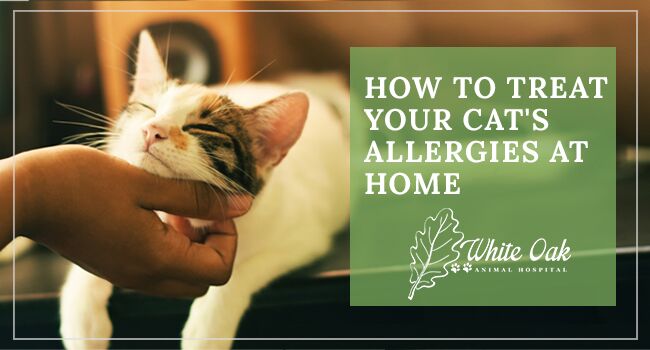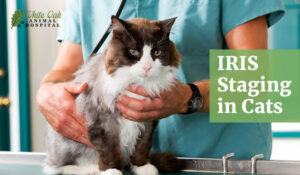
Would You Like to Know How to Get Rid of Cat Allergies Naturally?
Like people, cats can develop allergies to pollen, grass, dust, etc.
In addition, allergic cats develop many of the same symptoms as humans.
Unfortunately, untreated allergies can get worse.
Your cat can develop more severe allergy attacks over time.
Frequent or prolonged allergic reactions can also weaken your cat’s immune system and cause dangerous complications, like fungal or bacterial infections on the skin or in the sinuses, lungs, and ears.
Also, if left untreated, cats risk developing allergies to more substances, leading to even more attacks.
If your cat has asthma, failure to treat allergies can gradually lead to more severe and frequent asthma attacks.
Cat Allergy Symptoms
Cats with allergies sneeze, cough, and get watery eyes and runny noses as people do.
If your cat has seasonal allergies, you will also notice:
- Bald spots
- Excessive scratching
- Redness around chin, ears, eyes, or mouth
- Skin irritation
- Snoring (caused by irritation in the throat).
Household Changes to Treat Your Cat’s Allergies
If your cat has seasonal allergies, you can make a few simple changes at home.
Keep your cat indoors when the pollen count is high.
Also, keep your home allergen-free. Vacuum and wipe often, and change your HVAC filters monthly.
In addition, consider purchasing an air purifier to remove dust and pollen from the air.
Make sure your cat is flea free. Flea allergies are common in cats; all it takes is one bite to trigger the allergic response.
Is your cat itchy and scratchy around his mouth? If his food dish is plastic, he might be allergic to the bowl. Try switching to glass, metal, or ceramic.
Switch cat litter. Some cats are sensitive to chemicals and scents in many cat litter brands. Find a bag of low-dust, chemical-free litter and give it a try.
Do you like to cook? Try a home-cooked diet for cat allergies. Often limiting ingredients in a cat’s diet helps with allergy symptoms.
PET | TAO Limited Ingredient Recipe is the perfect food for allergic cats.
Home Remedies for Treating Cat Allergies
Sometimes you can treat cat allergies with home remedies.
Our favorites include pine bark extract, apple cider vinegar, and coconut oil.
Pine Bark Extract
Give pine bark orally as a supplement.
Pine bark extract is a powerhouse and:
- Has excellent antioxidant properties
- Supports the systems in control of inflammation
- Inhibits the release of histamine from mast cells.
Mast cells release histamine. Histamine triggers allergic symptoms when an allergen is present.
Pine bark extract blocks histamine release and decreases allergic symptoms.
Pine bark extract also helps normalize the immune response.
It inhibits Nuclear Factor-Kappa B (an immunity regulator protein) and lowers sensitivity for triggering an immune response.
To supplement your cat, look at the human dosing recommendations on the label.
Then, give your cat 1⁄8 to 1⁄4 of the recommended amount.
Apple Cider Vinegar
Add a small amount of Apple Cider Vinegar to your cat’s food.
Make sure to use apple cider vinegar, not distilled white vinegar.
Apple cider vinegar contains more nutrients than white vinegar.
Start by adding 1/4 teaspoon to food twice daily for cats under 12 pounds or 1/2 tsp for cats over 12 lbs.
Gradually increase the amount of vinegar to 1/4 teaspoon per 4 pounds of body weight.
Adding apple cider vinegar to food boosts your cat’s stomach acid, aiding digestion.
Efficient digestion often eliminates some food intolerances.
Apple cider vinegar also:
- Maintains your cat’s acid/alkaline balance
- Improves digestion
- Acts as a urinary system tonic
- Clears urinary tract infections.
Healthy changes boost your cat’s immune system and keep allergies at bay.
You can also use vinegar as a topical treatment.
Just mix vinegar and water at a ratio of 1⁄2 water to 1⁄2 vinegar, and either spray or dab the mixture onto the problem areas.
Vinegar works great for pustules, hot spots, and other allergic reactions on the skin.
If using topically on light-colored cats, use distilled white vinegar.
Apple cider vinegar may darken the fur of white and very light-colored cats.
Coconut Oil
Coconut oil helps your cat’s allergies from both inside and outside of the body.
Internally, coconut oil helps skin conditions and allergies because of its antioxidant effect.
Coconut oil helps a cat’s digestive system better absorb commercial cat food.
Just add a small spoonful at each feeding.
Externally, coconut oil treats ear mites, mange, and dry, itchy skin symptoms.
Some cat parents even tout coconut oil as a flea treatment.
The antioxidant properties of coconut oil soothe allergic sores and broken skin.
Coconut oil’s antibacterial and antifungal properties also prevent bacterial and fungal infections.
And, it’s totally ok for your cat to lick the coconut oil off his fur or skin.
He’s just given himself a nice, healthy internal dose of a coconut oil supplement!
Now you have an arsenal of ideas to help your allergic cat feel better.
If you try our recommendations and still have allergy problems, you should see your vet.
Medicinal Mushrooms
Medicinal mushrooms contain antioxidants that may help you get rid of cat allergies naturally.
Maitake, Reishi, Shitake, and Turkey Tail are the most common medicinal mushrooms available commercially.
Medicinal mushrooms support and balance the immune system, promoting overall pet health and well-being.
In addition, the Reishi mushroom reduces the release of histamine, which soothes itching and inflammation.
Reishi also facilitates oxygen supply to the body, which is essential in chronic and allergic asthma.
Choose high-quality mushrooms to reap the most benefit.
PET | TAO Complement Immune Mushroom Blend is an excellent choice.
Herbal Remedies
Herbal and other natural treatments are gentle and rarely have side effects.
Most herbal remedies start helping in two weeks. You’ll see maximum benefits in around six weeks.
If your cat’s still itching after three weeks, see your veterinarian.
Chronic, untreated itching can turn into “hot spots.”
Hot spots often escalate to bacterial, fungal, and yeast infections.
Good luck – herbs may help you get rid of cat allergies naturally!
Powerful Tools for Overcoming Cat Allergy Challenges
You can make many quick and easy changes at home to help you give your cat an edge in easing allergy challenges.
- Learn more about cat allergies.
- Switch to a Limited Ingredient Cat Food Recipe. PET | TAO Limited Ingredient Cat Food Recipe is naturally low in foods that stimulate an allergic response.
- Supplement with medicinal mushrooms. PET | TAO Complement Immune mushroom blend eases inflammatory response and allergy symptoms.
- Try digestive enzymes and probiotics. PET | TAO Harmonize GI boosts gut health and combats food allergens.
- Feed Beef Lung Treats. According to TCVM, Lung is on the same meridian as the skin. Therefore, lung treats help both breathing and skin allergies. Lung treats support lung and skin similar to a glandular supplement in a “like treats like” fashion.
- Learn more about TCVM Herbal Remedies. Chinese medicine offers many amazing solutions to get rid of cat allergies naturally. Some good examples are:
Related Posts
-
When Should I Spay or Neuter My Pet?
Should I Spay or Neuter My Pet? For many years, veterinarians recommended clients spay or…
-
What Every Pet Owner Should Know About Pet Allergies
Whether human or pet, allergies usually prove to be a complicated, and sometimes frustrating, topic.…
-
Managing Pet Dental Needs at Home
Looking for ways to manage your pet dental care needs at home? While we…
-
Cytauxzoonosis: How to Protect Your Cat From "Bobcat Fever"
Could Your Cat Get Cytauxzoonosis or Bobcat Fever? Unfortunately, the chances of your cat…









